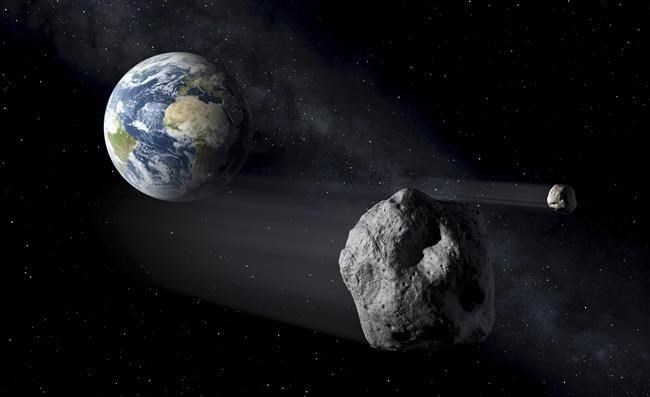
In this artistic rendering, two asteroids fly past Earth. An asteroid will whiz harmlessly past Earth Saturday June 29, 2024. With the right equipment and timing, you just might spot it. Called 2024 MK, the space rock will make its closest approach to Earth at 9:46 AM EST (13:46 GMT) passing by at about three-quarters the distance from Earth to the moon. It was first spotted two weeks ago by South African astronomers and is about 393 feet to 853 feet (120 to 260 meters) wide.
Image Credit: (ESA via AP)
June 28, 2024 - 9:00 PM
An asteroid will whiz harmlessly past Earth this weekend. With the right equipment and timing, you just might spot it.
Called 2024 MK, the space rock will make its closest approach to Earth Saturday morning, passing by at about three-quarters the distance from Earth to the moon. It was first spotted two weeks ago by a South African observatory and is about 393 feet to 853 feet (120 meters to 260 meters) wide.
Smaller objects shoot past Earth all the time, according to asteroid expert Davide Farnocchia with NASA’s Center for Near-Earth Object Studies. Asteroids the size of this latest one fly by about every 25 years or so.
“We’re going to see a few of those during our lifetimes, but it’s not something that happens every other day,” he said.
A 7,579-foot (2,310-meter) asteroid flew safely past Earth Thursday, but it was farther away and was only visible to professional telescopes.
For Saturday, skywatchers will need to grab a small telescope since the asteroid isn’t bright enough to be seen with the naked eye. And it’ll be moving quickly across the southern sky, making it difficult to spot.
“The asteroid will be plowing through that field of stars,” said Nick Moskovitz, an astronomer at Lowell Observatory.
Viewers in the Southern Hemisphere will have the best chance of seeing it since the asteroid will appear higher overhead. Those in the U.S. may want to wait until Saturday night, when the asteroid may appear less bright but will be easier to spot without interference from the sun’s blinding light.
If you miss out, mark your calendar for April 13, 2029, when an asteroid called Apophis will fly by Earth and will be visible to the naked eye from parts of Europe, Africa and Asia.
___
The Associated Press Health and Science Department receives support from the Howard Hughes Medical Institute’s Science and Educational Media Group. The AP is solely responsible for all content.
News from © The Associated Press, 2024